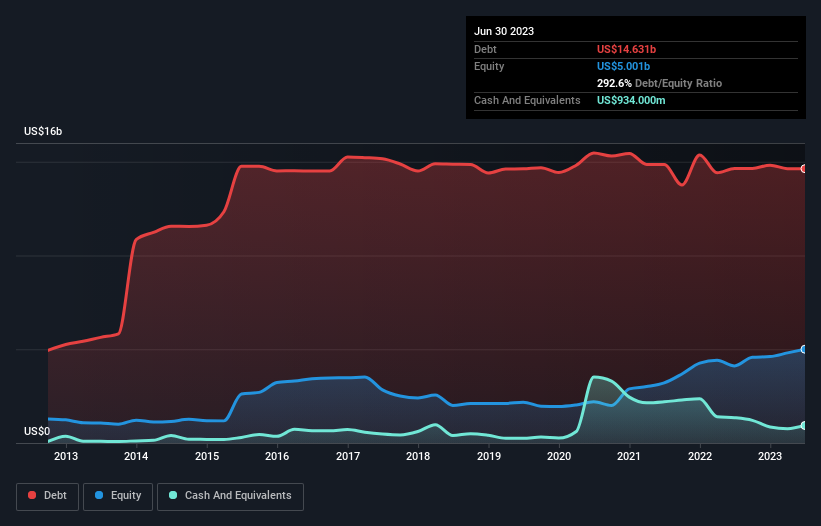
David Iben put it well when he said, 'Volatility is not a risk we care about. What we care about is avoiding the permanent loss of capital.' So it seems the smart money knows that debt - which is usually involved in bankruptcies - is a very important factor, when you assess how risky a company is. Importantly, Tenet Healthcare Corporation (NYSE:THC) does carry debt. But should shareholders be worried about its use of debt?
Why Does Debt Bring Risk?
Debt is a tool to help businesses grow, but if a business is incapable of paying off its lenders, then it exists at their mercy. In the worst case scenario, a company can go bankrupt if it cannot pay its creditors. However, a more usual (but still expensive) situation is where a company must dilute shareholders at a cheap share price simply to get debt under control. Of course, the upside of debt is that it often represents cheap capital, especially when it replaces dilution in a company with the ability to reinvest at high rates of return. When we think about a company's use of debt, we first look at cash and debt together.
View our latest analysis for Tenet Healthcare
How Much Debt Does Tenet Healthcare Carry?
As you can see below, Tenet Healthcare had US$14.6b of debt, at June 2023, which is about the same as the year before. You can click the chart for greater detail. However, it also had US$934.0m in cash, and so its net debt is US$13.7b.

How Healthy Is Tenet Healthcare's Balance Sheet?
Zooming in on the latest balance sheet data, we can see that Tenet Healthcare had liabilities of US$4.15b due within 12 months and liabilities of US$18.0b due beyond that. On the other hand, it had cash of US$934.0m and US$3.76b worth of receivables due within a year. So its liabilities outweigh the sum of its cash and (near-term) receivables by US$17.5b.
This deficit casts a shadow over the US$7.80b company, like a colossus towering over mere mortals. So we definitely think shareholders need to watch this one closely. At the end of the day, Tenet Healthcare would probably need a major re-capitalization if its creditors were to demand repayment.
In order to size up a company's debt relative to its earnings, we calculate its net debt divided by its earnings before interest, tax, depreciation, and amortization (EBITDA) and its earnings before interest and tax (EBIT) divided by its interest expense (its interest cover). The advantage of this approach is that we take into account both the absolute quantum of debt (with net debt to EBITDA) and the actual interest expenses associated with that debt (with its interest cover ratio).
Tenet Healthcare's debt is 3.7 times its EBITDA, and its EBIT cover its interest expense 3.2 times over. This suggests that while the debt levels are significant, we'd stop short of calling them problematic. The good news is that Tenet Healthcare improved its EBIT by 2.8% over the last twelve months, thus gradually reducing its debt levels relative to its earnings. The balance sheet is clearly the area to focus on when you are analysing debt. But it is future earnings, more than anything, that will determine Tenet Healthcare's ability to maintain a healthy balance sheet going forward. So if you're focused on the future you can check out this free report showing analyst profit forecasts.
But our final consideration is also important, because a company cannot pay debt with paper profits; it needs cold hard cash. So the logical step is to look at the proportion of that EBIT that is matched by actual free cash flow. In the last three years, Tenet Healthcare's free cash flow amounted to 34% of its EBIT, less than we'd expect. That weak cash conversion makes it more difficult to handle indebtedness.
Our View
Mulling over Tenet Healthcare's attempt at staying on top of its total liabilities, we're certainly not enthusiastic. Having said that, its ability to grow its EBIT isn't such a worry. We should also note that Healthcare industry companies like Tenet Healthcare commonly do use debt without problems. Overall, it seems to us that Tenet Healthcare's balance sheet is really quite a risk to the business. For this reason we're pretty cautious about the stock, and we think shareholders should keep a close eye on its liquidity. The balance sheet is clearly the area to focus on when you are analysing debt. But ultimately, every company can contain risks that exist outside of the balance sheet. For instance, we've identified 4 warning signs for Tenet Healthcare (1 makes us a bit uncomfortable) you should be aware of.
If, after all that, you're more interested in a fast growing company with a rock-solid balance sheet, then check out our list of net cash growth stocks without delay.
Valuation is complex, but we're here to simplify it.
Discover if Tenet Healthcare might be undervalued or overvalued with our detailed analysis, featuring fair value estimates, potential risks, dividends, insider trades, and its financial condition.
Access Free AnalysisHave feedback on this article? Concerned about the content? Get in touch with us directly. Alternatively, email editorial-team (at) simplywallst.com.
This article by Simply Wall St is general in nature. We provide commentary based on historical data and analyst forecasts only using an unbiased methodology and our articles are not intended to be financial advice. It does not constitute a recommendation to buy or sell any stock, and does not take account of your objectives, or your financial situation. We aim to bring you long-term focused analysis driven by fundamental data. Note that our analysis may not factor in the latest price-sensitive company announcements or qualitative material. Simply Wall St has no position in any stocks mentioned.
About NYSE:THC
Tenet Healthcare
Operates as a diversified healthcare services company in the United States.
Very undervalued with proven track record.


